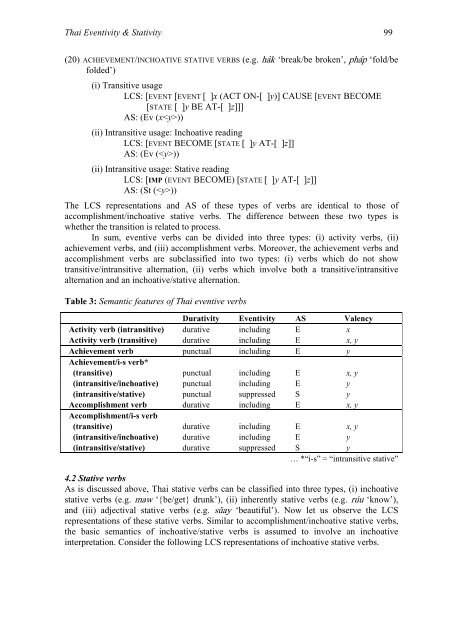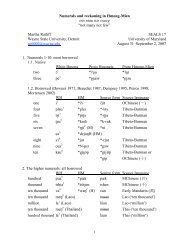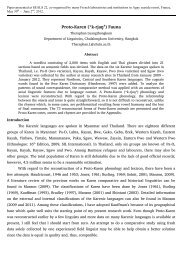proto-southwestern-tai revised: a new reconstruction - seals 22
proto-southwestern-tai revised: a new reconstruction - seals 22
proto-southwestern-tai revised: a new reconstruction - seals 22
You also want an ePaper? Increase the reach of your titles
YUMPU automatically turns print PDFs into web optimized ePapers that Google loves.
Thai Eventivity & Stativity 99<br />
(20) ACHIEVEMENT/INCHOATIVE STATIVE VERBS (e.g. ha�k ‘break/be broken’, pha�p ‘fold/be<br />
folded’)<br />
(i) Transitive usage<br />
LCS: [EVENT [EVENT [ ]x (ACT ON-[ ]y)] CAUSE [EVENT BECOME<br />
[STATE [ ]y BE AT-[ ]z]]]<br />
AS: (Ev (x))<br />
(ii) Intransitive usage: Inchoative reading<br />
LCS: [EVENT BECOME [STATE [ ]y AT-[ ]z]]<br />
AS: (Ev ())<br />
(ii) Intransitive usage: Stative reading<br />
LCS: [IMP (EVENT BECOME) [STATE [ ]y AT-[ ]z]]<br />
AS: (St ())<br />
The LCS representations and AS of these types of verbs are identical to those of<br />
accomplishment/inchoative stative verbs. The difference between these two types is<br />
whether the transition is related to process.<br />
In sum, eventive verbs can be divided into three types: (i) activity verbs, (ii)<br />
achievement verbs, and (iii) accomplishment verbs. Moreover, the achievement verbs and<br />
accomplishment verbs are subclassified into two types: (i) verbs which do not show<br />
transitive/intransitive alternation, (ii) verbs which involve both a transitive/intransitive<br />
alternation and an inchoative/stative alternation.<br />
Table 3: Semantic features of Thai eventive verbs<br />
Durativity Eventivity AS Valency<br />
Activity verb (intransitive) durative including E x<br />
Activity verb (transitive) durative including E x, y<br />
Achievement verb punctual including E y<br />
Achievement/i-s verb*<br />
(transitive) punctual including E x, y<br />
(intransitive/inchoative) punctual including E y<br />
(intransitive/stative) punctual suppressed S y<br />
Accomplishment verb durative including E x, y<br />
Accomplishment/i-s verb<br />
(transitive) durative including E x, y<br />
(intransitive/inchoative) durative including E y<br />
(intransitive/stative) durative suppressed S y<br />
… *“i-s” = “intransitive stative”<br />
4.2 Stative verbs<br />
As is discussed above, Thai stative verbs can be classified into three types, (i) inchoative<br />
stative verbs (e.g. maw ‘{be/get} drunk’), (ii) inherently stative verbs (e.g. rúu ‘know’),<br />
and (iii) adjectival stative verbs (e.g. sǔay ‘beautiful’). Now let us observe the LCS<br />
representations of these stative verbs. Similar to accomplishment/inchoative stative verbs,<br />
the basic semantics of inchoative/stative verbs is assumed to involve an inchoative<br />
interpretation. Consider the following LCS representations of inchoative stative verbs.





